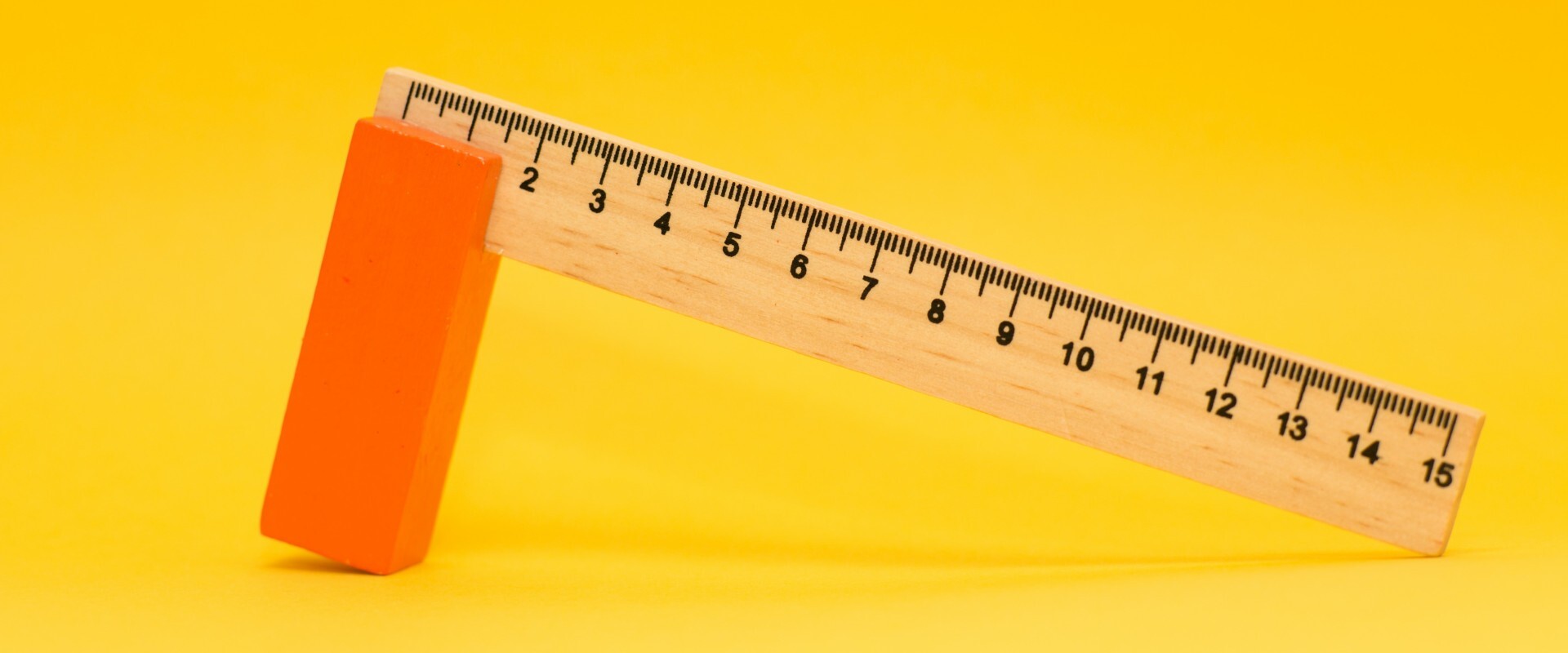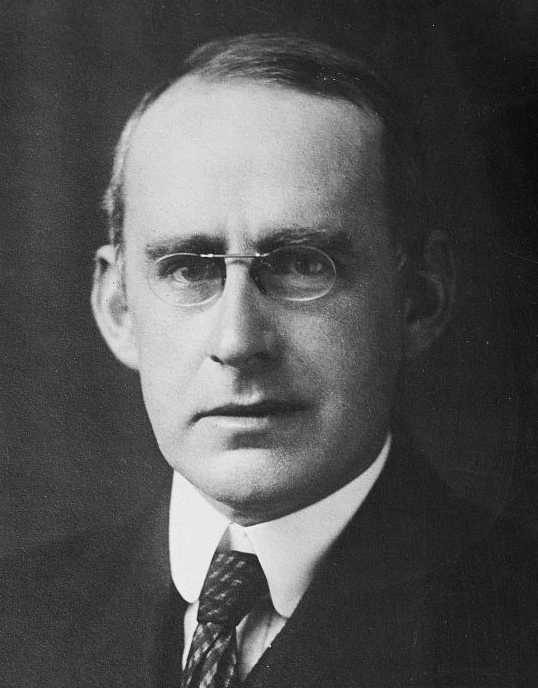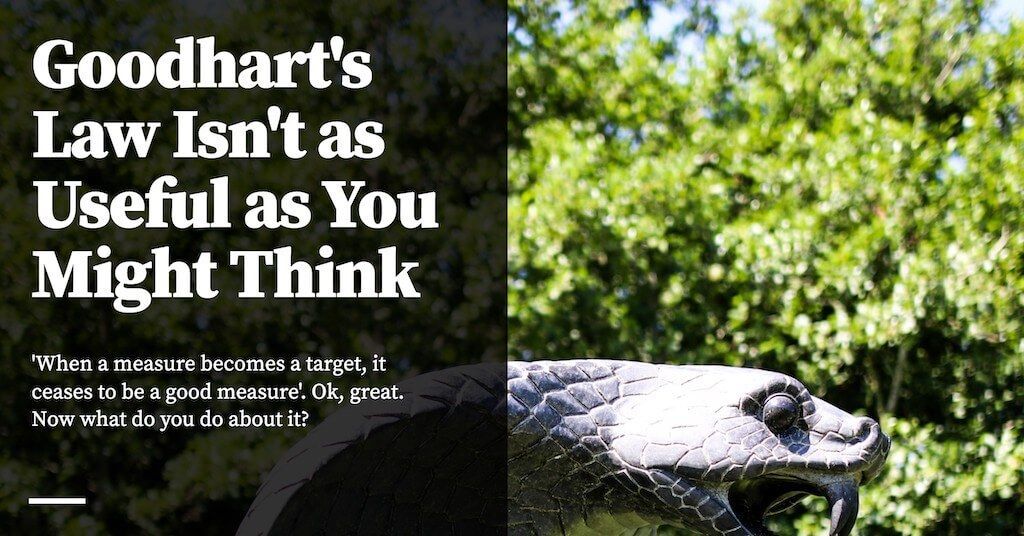#quantification
Measurement is Science - I was watching Ben Krasnow making iron nitride permanent magnets and was struck by... - https://hackaday.com/2025/06/21/measurement-is-science/ #hackadaycolumns #quantification #measurement #science #magnets #rants
Although there's lots of corporate bullshit in what is written in the article linked below (namely, the stuff about self-driving cars), some insights do really standout.
"For leaders steering their organizations through this turbulent transition, what lies beyond the spreadsheet? It’s everything that won’t fit in a cell: the skills that refuse to be tallied, the open-ended problems with no reliable precedent, the intangibles—trust, taste, and the subtle dimensions of quality and experience—and the conviction to press ahead even when every metric says “wait.” Manage only what you can measure, and you surrender the most valuable ground to rivals who cultivate what can’t be counted. Amar Bose, the sound and electrical engineer who founded the Bose Corporation, proved the point: while others worshipped spec-sheet numbers, he zeroed in on how music sounded to people in real rooms—a quality no existing metric could catch—and in doing so, he rewrote the rules of the audio industry.
Directionally, the prescription is simple. Back wildcard bets with fuzzy ROI, reward teams that reframe problems and lean into the unknown, and rotate talent through roles that confront uncertainty across R&D, new markets, and complex customer, partner, and policy interactions. Carve out slack time and engineer cross-team collisions to spark serendipity and idea recombination. Treat those pockets of planned ambiguity not as liabilities, but as strategic assets."

Quantifying The Compounding Effects Of Natural Hazard Events - A Case Study On Wildfires And Floods In California
--
https://doi.org/10.1038/s44304-025-00090-7 <-- shared paper
--
#GIS #spatial #mapping #spatialanalysis #spatiotemporal #casestudy #California #wildfire #fire #flood #flooding #climatechange #weather #extremeweather #risk #hazard #debrisflow #massmovement #impacts #damage #infrastructure #cost #economics #quantification #compoundinghazards #compound #compounding #framework #naturalhazard #naturaldisaster #recovery #temporal #regional #planning #policy #management #mitigation #geology #soils #engineeringgeology #geomorphology #resilience #preparation
'A Comparative Evaluation of Quantification Methods', by Tobias Schumacher, Markus Strohmaier, Florian Lemmerich.
http://jmlr.org/papers/v26/21-0241.html
#classifiers #supervised #quantification
"Modern civilisation has a number of extremely delicate and highly interconnected components whose graceful degradation is effectively impossible."
It is "much easier to break things than to build them up. The government administrations of Britain, France and Germany for example, were set up at a time in the nineteenth century when the rising middle classes demanded a properly functioning state[…]. It took perhaps a generation for professional, neutral public services to fully emerge."
"Forty years of globalised neoliberalism have broken our societies, our economies and our political systems, and we no longer have the ability to put them back together."

Fig 3: In DIA, complexity skyrockets. No problem for CHIMERYS!
→ CHIMERYS delivers high ID rates with better FDR control than other solutions
→ More informative fragment utilization yields more reliable #quantification
It handles #DIA data in a spectrum-centric fashion.
4/7
Keynote Speaker : Valérie Charolles
Philosophe, chercheure au CNRS & à l’EHESS, Valérie Charolles s’attaque à un sujet… qui compte. Littéralement.
"Nos manières de compter, périls économiques, démocratiques et écologiques."
Valérie Charolles nous invite à questionner la domination des chiffres, leurs normes implicites, et l’impact qu’ils ont sur nos sociétés, nos démocraties, et notre planète.
Rendez-vous les 29 & 30 avril à CPE Lyon pour MiXiT 2025 !
Le programme complet est ici : https://mixitconf.org/2025?agenda=true
A Universal Framework For Inclusive 15-Minute Cities
--
https://doi.org/10.1038/s44284-024-00119-4 <-- shared paper
--
https://whatif.sonycsl.it/15mincity/ <-- author’s 15mincity online platform
--
#GIS #spatial #mapping #spatialanalysis #spatiotemporal #planning #city #15MinuteCities #15MinuteCity #cities #urban #urbanplanning #global #worldwide #accessibility #routing #social #community #quantification #inequality #socialjustice #resources #services #proximity #population #density #disparaties #socioeconomic #cultural #timebased #valuebased
"Rather than using metrics as the sole truth when it comes to assessing academic performance, we should put them in perspective. We could do this by complementing quantitative metrics with qualitative information. Narratives, discussions of assumptions, and explanations can give back much-needed context to interpret metrics. Read a job candidate’s working paper instead of counting her publications in journals. Metrics can be great conversation starters, but should not replace our understanding of what (a) good research(er) is.
If we don’t change our use of metrics, research quality itself may suffer. Peter Higgs, the Nobel laureate who passed away last year, warned in an interview: “Today I wouldn’t get an academic job. It’s as simple as that. I don’t think I would be regarded as productive enough.” The pressure to produce and perform in the short term can come at the expense of scientific progress in the long term. A more critical stance towards metrics and rankings is essential if we want to enhance the quality and credibility of research."
https://www.socialsciencespace.com/2025/01/how-research-credibility-suffers-in-a-quantified-society/

RT by @cleanenergy_EU: All ready for the holidays? There is probably one thing left to do...
Register to our new #webinar with @MICAT_EU, #ODYSSEEMURE & #Inherit on #quantification tools to design and implement targeted solutions to effectively reduce energy poverty
https://ieecp.org/events/quantifying-the-impact-addressing-energy-poverty-through-efficiency/
---
https://nitter.privacydev.net/RENOVERTYLife/status/1869380932312109112#m

I learned about cycling-related Eddington numbers recently.
Your Eddingon number is the largest integer n such that you have ridden at least n kilometers on at least n days (not necessarily consecutively: any days at all).
I wrote some code to find mine.
With data from 2001 to 2024, my Eddington number is 102. (I rode for many years before 2001, so my true number is somewhat (maybe just a little) higher, but records are scarce.)
So, I have ridden at least 102 kilometers on at least 102 days, and I have not ridden at least 103 kilometers on at least 103 days. In fact, I've ridden at least 103 kilometers on 101 days, so I'll need to do that just twice more to get my Eddington number up to 103. Sounds like a nice goal for 2025.
One can also use miles. An amusing thing to note is that you cannot simply convert the Eddington number in kilometers to the Eddington number in miles as you would a distance.
My Eddington number in miles is 68. 68 miles is about 109 kilometers, so my Eddington number in miles is both larger and smaller than my Eddington number in kilometers.
One can, of course, apply this to running, walking, swimming, or really any other quantifiable activity. What would be some interesting activities to apply this to?
One can also restrict the time period and look at one's Eddington number for, for example, single years. In the period 2001-2024, my (km) numbers ranged from 25 to a max of 61. The last time I was at or above 40 was 2017 (I've been in a slump since then).
Let me know if you'd like the (simple) code I wrote to calculate these numbers.
Let me know your Eddington number(s)!
https://en.wikipedia.org/wiki/Arthur_Eddington#Eddington_number_for_cycling

summarizes paper by Manheim and Garrabrant and *Working Backwards* by Bryar and Carr on how to address consequences of Goodhart's law: “Goodhart's law isn't as useful as you might think” https://commoncog.com/goodharts-law-not-useful/ #quantification

Saw this red-tailed hawk, while walking along the Kay Gardner Beltline Trail in Toronto, it was sitting on an old TV antenna.
I think that the long thin metal wires are for VHF and are 2meters in length, or 1m on each side. The shorter thin metal wires are for UHF and are about 70cm total length or 35cm on each side.
An adult red-tailed hawk is about 45-65cm long.
So the math works out, the hawk is the length of a UHF antenna.
On Saturday went to the Horse Pull at Markham Fair.
The winner were the Wessel's from Mindon Ontario. Pulled over 10,000lbs the required 15ft.
They competed in the Heavy Weight class, were a team of horses has a combined weight over 3400lbs.
The sled held almost a small wall of concrete on it.
A 160 LBS (77 KGS), pumpkin at the Markham Fair, and winner.
4 old thermometers at the Markham Fair in Ontario.
Three still working:
Bill Hood thermometer. 77^F
Markham Pharmacy thermometer, 75^F
Esso thermometer, 75^F
Should we go by consensus or by averaging?
Dexter Alert, watchman's clock, displayed at the Markham Fair.
"The guard carrying the Guardsman visits a series of stations in a predetermined order At each one, he inserts a recording key This registers the station number on the paper time-tape in the clock When a supervisor checks the tape, he can tell at a glance how faithfully the guard performed his duties." https://www.collectorsweekly.com/stories/246669-detex-guardsmans-watchclock
Old calendars at the Markham Fair, in Ontario. Small update-able ones.
The brass one was designed to work from 1940 to 1994.

